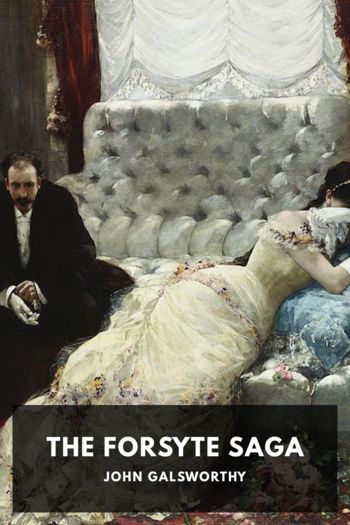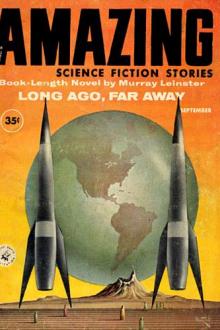The Forsyte Saga - John Galsworthy (best english novels for beginners .txt) 📗

- Author: John Galsworthy
Book online «The Forsyte Saga - John Galsworthy (best english novels for beginners .txt) 📗». Author John Galsworthy
George (it was he who invented many of those striking expressions still current in fashionable circles) voiced the sentiment more accurately than anyone when he said to his brother Eustace that the Buccaneer was “going it.” he expected Soames was about “fed up.”
It was felt that he must be, and yet, what could be done? He ought perhaps to take steps; but to take steps would be deplorable.
Without an open scandal which they could not see their way to recommending, it was difficult to see what steps could be taken. In this impasse, the only thing was to say nothing to Soames, and nothing to each other; in fact, to pass it over.
By displaying towards Irene a dignified coldness, some impression might be made upon her; but she was seldom now to be seen, and there seemed a slight difficulty in seeking her out on purpose to show her coldness. Sometimes in the privacy of his bedroom James would reveal to Emily the real suffering that his son’s misfortune caused him.
“I can’t tell,” he would say; “it worries me out of my life. There’ll be a scandal, and that’ll do him no good. I shan’t say anything to him. There might be nothing in it. What do you think? She’s very artistic, they tell me. What? Oh, you’re a ‘regular Juley!’ Well, I don’t know; I expect the worst. This is what comes of having no children. I knew how it would be from the first. They never told me they didn’t mean to have any children—nobody tells me anything!”
On his knees by the side of the bed, his eyes open and fixed with worry, he would breathe into the counterpane. Clad in his nightshirt, his neck poked forward, his back rounded, he resembled some long white bird.
“Our Father—” he repeated, turning over and over again the thought of this possible scandal.
Like old Jolyon, he, too, at the bottom of his heart set the blame of the tragedy down to family interference. What business had that lot—he began to think of the Stanhope Gate branch, including young Jolyon and his daughter, as “that lot”—to introduce a person like this Bosinney into the family? (He had heard George’s soubriquet, “The Buccaneer,” but he could make nothing of that—the young man was an architect.)
He began to feel that his brother Jolyon, to whom he had always looked up and on whose opinion he had relied, was not quite what he had expected.
Not having his eldest brother’s force of character, he was more sad than angry. His great comfort was to go to Winifred’s, and take the little Darties in his carriage over to Kensington Gardens, and there, by the Round Pond, he could often be seen walking with his eyes fixed anxiously on little Publius Dartie’s sailing-boat, which he had himself freighted with a penny, as though convinced that it would never again come to shore; while little Publius—who, James delighted to say, was not a bit like his father skipping along under his lee, would try to get him to bet another that it never would, having found that it always did. And James would make the bet; he always paid—sometimes as many as three or four pennies in the afternoon, for the game seemed never to pall on little Publius—and always in paying he said: “Now, that’s for your money-box. Why, you’re getting quite a rich man!” The thought of his little grandson’s growing wealth was a real pleasure to him. But little Publius knew a sweet-shop, and a trick worth two of that.
And they would walk home across the Park, James’ figure, with high shoulders and absorbed and worried face, exercising its tall, lean protectorship, pathetically unregarded, over the robust child-figures of Imogen and little Publius.
But those Gardens and that Park were not sacred to James. Forsytes and tramps, children and lovers, rested and wandered day after day, night after night, seeking one and all some freedom from labour, from the reek and turmoil of the streets.
The leaves browned slowly, lingering with the sun and summer-like warmth of the nights.
On Saturday, October 5, the sky that had been blue all day deepened after sunset to the bloom of purple grapes. There was no moon, and a clear dark, like some velvety garment, was wrapped around the trees, whose thinned branches, resembling plumes, stirred not in the still, warm air. All London had poured into the Park, draining the cup of summer to its dregs.
Couple after couple, from every gate, they streamed along the paths and over the burnt grass, and one after another, silently out of the lighted spaces, stole into the shelter of the feathery trees, where, blotted against some trunk, or under the shadow of shrubs, they were lost to all but themselves in the heart of the soft darkness.
To fresh-comers along the paths, these forerunners formed but part of that passionate dusk, whence only a strange murmur, like the confused beating of hearts, came forth. But when that murmur reached each couple in the lamplight their voices wavered, and ceased; their arms enlaced, their eyes began seeking, searching, probing the blackness. Suddenly, as though drawn by invisible hands, they, too, stepped over the railing, and, silent as shadows, were gone from the light.
The stillness, enclosed in the far, inexorable roar of the town, was alive with the myriad passions, hopes, and loves of multitudes of struggling human atoms; for in spite of the disapproval of that great body of Forsytes, the Municipal Council—to whom Love had long been considered, next to the Sewage Question, the gravest danger to the community—a process was going on that night in the Park, and in a hundred other parks, without which the thousand factories, churches, shops, taxes, and drains, of which they were custodians, were as arteries without blood, a man without a heart.
The instincts of self-forgetfulness, of passion,





Comments (0)